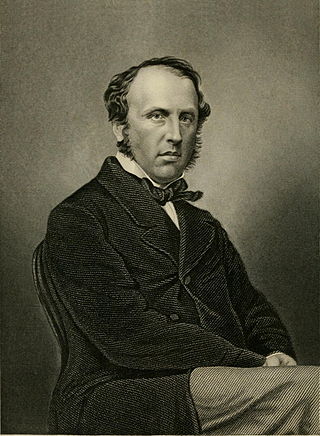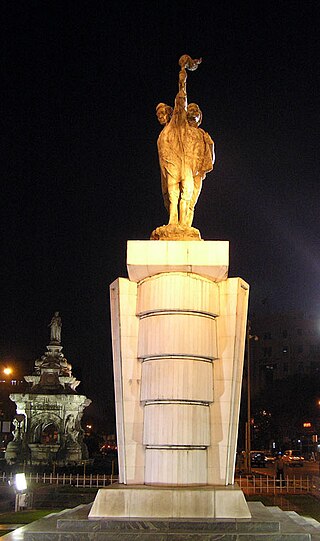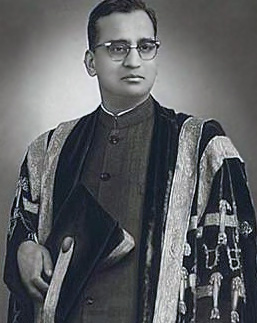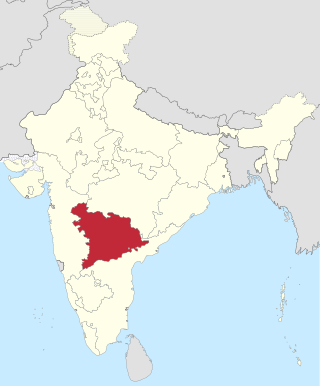
The Bombay Natural History Society (BNHS), founded on 15 September 1883, is one of the largest non-governmental organisations in India engaged in conservation and biodiversity research. It supports many research efforts through grants and publishes the Journal of the Bombay Natural History Society. Many prominent naturalists, including the ornithologists Sálim Ali and S. Dillon Ripley, have been associated with it.

India is a federal union comprising 28 states and 8 union territories, with a total of 36 entities. The states and union territories are further subdivided into districts and smaller administrative divisions.

Charles Canning, 1st Earl Canning,, also known as The Viscount Canning and Clemency Canning, was a British statesman and Governor-General of India during the Indian Rebellion of 1857 and the first Viceroy of India after the transfer of power from the East India Company to the Crown of Queen Victoria in 1858 after the rebellion was crushed.

Samyukta Maharashtra Movement, commonly known as the Samiti, was an organisation in India that advocated for a separate Marathi-speaking state in Western India and Central India from 1956 to 1960.

Sir Richard Strachey was a British soldier and Indian administrator, the third son of Edward Strachey and grandson of Sir Henry Strachey, 1st Baronet.

Sir Pherozeshah Merwanjee Mehta was an Indian politician and lawyer from Bombay. He was knighted by the British Government in India for his service to the law. He became the Municipal commissioner of Bombay Municipality in 1873 and its president four times – 1884, 1885, 1905 and 1911. Mehta was one of the founding members and President of the Indian National Congress in 1890 held at Calcutta.

Amravati Division, also known as Varhad, is an Indian one of the six administrative divisions of Maharashtra state in India. Amravati and Nagpur divisions constitute the ancient Vidarbha region. Amravati Division is bound by Madhya Pradesh state to the north, Nagpur Division to the east, Telangana state to the southeast, Marathwada region to the south and southwest, and Nashik Division to the west.

Sir Dorabji Tata was an Indian businessman of the British Raj, and a key figure in the history and development of the Tata Group. He was knighted in 1910 for his contributions to industry in British India.

The British Raj was the rule of the British Crown on the Indian subcontinent; it is also called Crown rule in India, or Direct rule in India, and lasted from 1858 to 1947. The region under British control was commonly called India in contemporaneous usage and included areas directly administered by the United Kingdom, which were collectively called British India, and areas ruled by indigenous rulers, but under British paramountcy, called the princely states. The region was sometimes called the Indian Empire, though not officially.

Vijayendra Kasturi Ranga Varadaraja Rao was an Indian economist, politician and educator.

Sir Chintaman Dwarakanath Deshmukh, was an Indian civil servant and the first Indian to be appointed the Governor of the Reserve Bank of India in 1943 by the British Raj authorities. He subsequently served as the Finance Minister in the Union Cabinet (1950–1956). It was during this time that he also became a founding member of the Governing Body of NCAER, the National Council of Applied Economic Research in New Delhi, India's first independent economic policy institute established in 1956 at the behest of Prime Minister Jawaharlal Nehru. After resignation from Union Cabinet he worked as Chairman of UGC (1956–1961). He served as Vice-Chancellor of University of Delhi (1962–67). He was also President of Indian Statistical Institute from 1945 to 1964, Honorary Chairman of National Book Trust (1957–60). He founded India International Center in 1959 and served as Lifetime President of it. He was also chairman of Indian Institute of Public Administration.
The States Reorganisation Commission (SRC) constituted by the Central Government of India in December 1953 to recommend the reorganization of state boundaries. In September 1955, after two years of study, the Commission, comprising Justice Fazal Ali, K. M. Panikkar and H. N. Kunzru, submitted its report. The commission's recommendations were accepted with some modifications and implemented in the States Reorganisation Act in November, 1956. The act provided that India's state boundaries should be reorganised to form 14 states and 6 centrally administered territories.
The Bombay Plan is the name commonly given to a World War II-era set of Import substitution industrialization-based proposals for the development of the post-independence economy of India. The plan, published in 1944/1945 by eight leading Indian industrialists, proposed state intervention in the economic development of the nation after independence from the United Kingdom.

General elections were held in British India in November 1923 for both the Central Legislative Assembly and Provincial Assemblies. The Central Legislative Assembly had 145 seats, of which 105 were elected by the public.
General elections were held in British India in September 1930. They were boycotted by the Indian National Congress and marked by public apathy. The newly elected Central Legislative Assembly met for the first time on 14 January 1931.
Sir Ardeshir Dalal, KCIE was an Indian Parsi civil servant, and later, a businessman associated with the Tata Group. He was knighted in 1946, and was a vocal opponent of the partition of India.

Hyderabad State was a state in Dominion and later Republic of India, formed after the accession of the State of Hyderabad into the Union on 17 September 1948. It existed from 1948 to 1956.

Mahagujarat movement, known as Mahagujarat Andolan locally, was a political movement demanding the creation of the state of Gujarat for Gujarati-speaking people from the bilingual Bombay state of India in 1956. It succeeded in the formation of Gujarat, on 1 May 1960.
Sir Purshottamdas Thakurdas (1879–1961),, was a Gujarati cotton trader, mill owner, businessman and industrialist from Mumbai, India. He was one of the signatory of Bombay Plan, which was set of proposals for the post-independence economy of India. He along with GD Birla established Federation of Indian Chambers of Commerce & Industry in 1927 on the advice of Mahatma Gandhi. He was a member of the Hilton Young Commission.He was a member of the Acworth Committee. He headed the Foodgrain Policy Committee of 1947.













